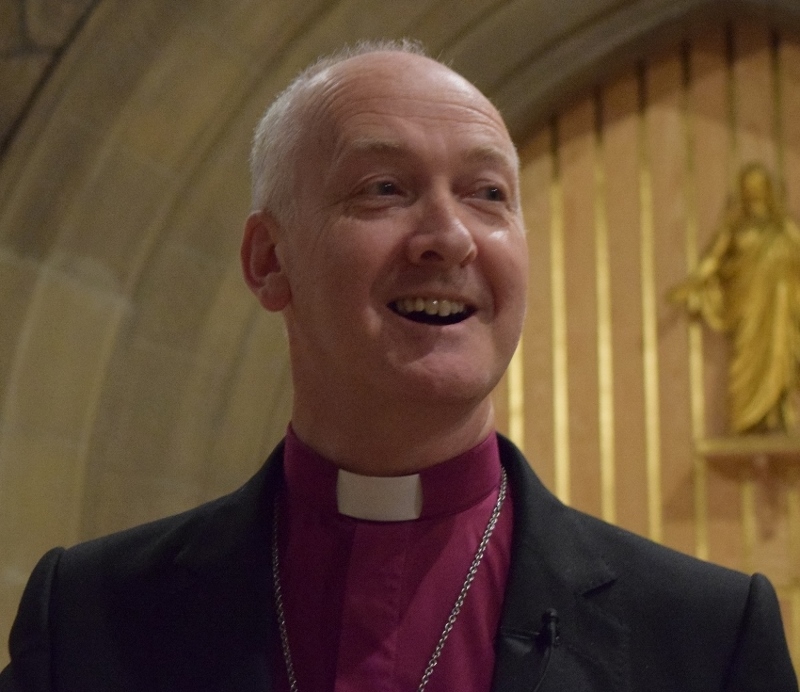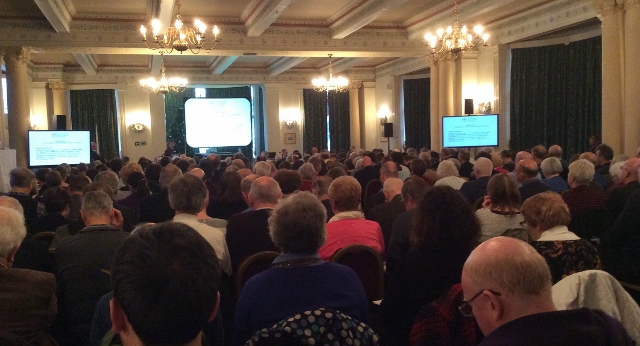 Diocese of Leeds
Diocese of Leeds
First Diocesan Synod, Saturday 22 November 2014
Every now and then it is good for any institution to be compelled to ask what and whom it is for. A reality check is essential, if we are to live in the real world, establish realistic priorities, and not simply limp through life comforted by illusions of adequacy.
Well, I guess we are getting a bit fed up asking these questions by now! For nearly four years we have been walking through the Valley of Uncertainty towards the brave new world of West Yorkshire and the Dales, being compelled to ask fundamental questions about the shape, role and raison d'être of the Church of England in this part of the world. We bring our inherited stories and traditions, our experience and assumptions, and we have had to have the courage to choose change (rather than allow ourselves to be victims of it).
So, now we are here. The work of transition has been demanding and difficult, complex and challenging, but it has also opened up for us new possibilities and new opportunities for recovering and re-appropriating the core of our mission as a church of Jesus Christ. And this transitional work continues today.
At this first synod of the Diocese of Leeds it is important to recognise the journey we have been on. Although the Bishop's Councils of the three former dioceses have formed the transitional Bishop's Council in the last year, this is the first time the three former synods have come together as a single synod for a single diocese. Furthermore, we convene today knowing that we then only have one further meeting before being dissolved - an experience with which we are becoming very familiar - in summer 2015 ahead of the election of a new synod for a new triennium. We live in interesting times, and I will return to this scenario in a moment.
First, it will not have escaped your attention that we begin this morning without John Tuckett who has served as the Programme Manager and acting Diocesan Secretary since the inception of the new diocese. John came to us as Programme Manager without a programme to manage. He has stuck with us despite many challenges (not all of which have been seen in public). Despite many opportunities to move on, he has shown great loyalty and commitment to what we are trying to do. He has brought an outside eye and, both implicitly and explicitly, challenged the assumptions behind the church and diocese's way of doing things. He has done what we asked of him.
However, John informed me last week that he has been headhunted for another post and will be leaving us. As you can imagine, this came as a great shock to me - as it probably has to you. Given his drive and energy, his loss leaves us with a big change and a huge challenge - especially given the timing. I and the chairman of the DBF have agreed to release John with immediate effect, in accordance with the terms of his contract, and to reconfigure how we should proceed as a diocese from here. The news of his departure has not come at the most convenient time for us, but it also opens up a fresh opportunity to re-think and re-shape.
Before moving on to what happens next, I want to record my and our gratitude to John for the work he has done among us and the challenge he has brought to us. We wish him well in the next stage of his career.
When John came among us several years ago, we were three dioceses approaching change in different ways and with different levels of enthusiasm. No one - and certainly no one bishop - could lead the process. John was appointed to drive the process and try to hold it together, but with no certainty of any particular outcome. We then had to await the determining vote of the General Synod. We then had to wait another seven months for the announcement of who would be the first Diocesan Bishop of Leeds... who then had to be put in. During this time the common thread was John Tuckett working with Debbie Child and Ashley Ellis. Bishop Tom Butler agreed to emerge from retirement and serve as the chair of the transitional DBF as well as the acting Area Bishop of Bradford. We have relied on the generosity, maturity, vision and wisdom of some very remarkable people to whom we owe a great debt.
However, we are now in a different place. We are a single diocese and have our team of bishops identified and (almost) in place. Hard work has gone into researching and imagining new ways of being a diocese and doing our business within the constraints of legislation by which we are bound. We have bedded in new ways of working and have now identified the projects we need to work on in order to shape the diocese we want to be for the future.
Additionally, I am pleased to announce this morning that Dr Richard Noake has been appointed as the Diocesan Director of Education and will take up his new responsibilities soon. There is a lot of work to be done. Furthermore, I am now working on the appointment of a Diocesan Chancellor, and hope to have made progress before the end of the year.
As you can imagine, we have not had much time in which to come to terms with John Tuckett's news, and to re-think how to proceed from here. That being said, and recognising that this now inevitably and belatedly changes elements of the agenda that had already gone out, I have asked Debbie Child and Ashley Ellis, working together as joint acting Diocesan Secretaries, to lead our administration and to help structure the change programme we need to deliver more quickly. I am pleased to say that they have agreed. We know we can have complete confidence in them.
Today we face an agenda that appears to be inward-looking and institutional. It is. There is no option. It has taken a considerable amount of work to get to this first Synod at this time and we have no option but to attend to those decisions laid upon us. We cannot act as a synod without standing orders - even though we know the standing orders before us today (with some helpful amendments) simply get us going and give us the space to work on them properly during the coming year. We need a budget for 2015 - even though we know some of the figures might be proved inaccurate because of factors that might change our priorities and ability to do what we set out to do. We need to establish the foundation of our governance - even though we know we will then have to do a considerable amount of work in fleshing it out and making it work ... whatever the 'it' might turn out to be once the Synod has decided.
This means that we are being invited today to agree on a way forward, not to make final and ultimate decisions. What we decide today will allow us the space to do more work in the next few months on how we want to shape our ways for the future. Therefore, I hope we can be mature about our processes, keep means and ends in perspective, and conduct ourselves with wisdom and generosity.
So, our agenda might be inward looking - we have no option here unless we want to stay overnight and fill tomorrow as well. But, this should not blind us to the context in which we meet. We should all be immensely proud that the last motion to go to the General Synod from the Diocese of Bradford and the first to be debated from the Diocese of Leeds was focused not on churchy matters, but justice for the people of our parishes. Those whose poverty is deepened by the so-called Bedroom Tax need the voice of those who see beyond the politics to the human need. Ian Fletcher drove the motion that went through on Tuesday without opposition. Today the joint Disability Forum launches here access guidelines 'Welcome, Inclusion and Respect'.
Furthermore, our domestic political agenda is shadowed by the massive crises faced by millions around the world. It is said that fifty million people have been displaced by recent conflicts and the scale of human suffering - to say nothing of the seeds sown for future violence and conflict - is almost too much to imagine. As we know, our Christian brothers and sisters in Syria, Iraq and elsewhere are being persecuted with horrific violence - and they need to know that they are not forgotten. We must continue to pray; we must continue to give - to aid agencies, to Christian agencies providing particular types of care and relief, and to act - lobbying our politicians, engaging with the media and shaping debate about our priorities and values. Are we content to live in a country that refuses to address the question of asylum for people who have lost everything and have nowhere to go back to? Or to choose to allow large numbers of people to drown in the Mediterranean Sea in order to discourage them from escaping their homelands?
Well, we might be content or we might be appalled. That is for each of us - individually and together - to work at as we enter 2015 and think through our politics in the light of our theology. In between, we celebrate at Christmas the God who comes among us, entering into the heart of the world's joys and sufferings, shining light into the darkness and exploding the misery with costly hope.
As we faithfully and humbly continue our work of shaping this diocese, we may do so with confidence: in God who has called us to be drawn by hope and not driven by fear; in each other as we bring our gifts and passions, our strengths and weaknesses to our discipleship and our common life and mission; in the church as it creates the space in which people can find that they have been found by God. In all we do and say today may we keep in mind our vocation to be a confident and vibrant church and diocese, equipping confident clergy to enable confident Christians to live and tell the good news of God in Christ across the parishes of this diocese and region.
The Rt Revd Nicholas Baines
Bishop of Leeds
